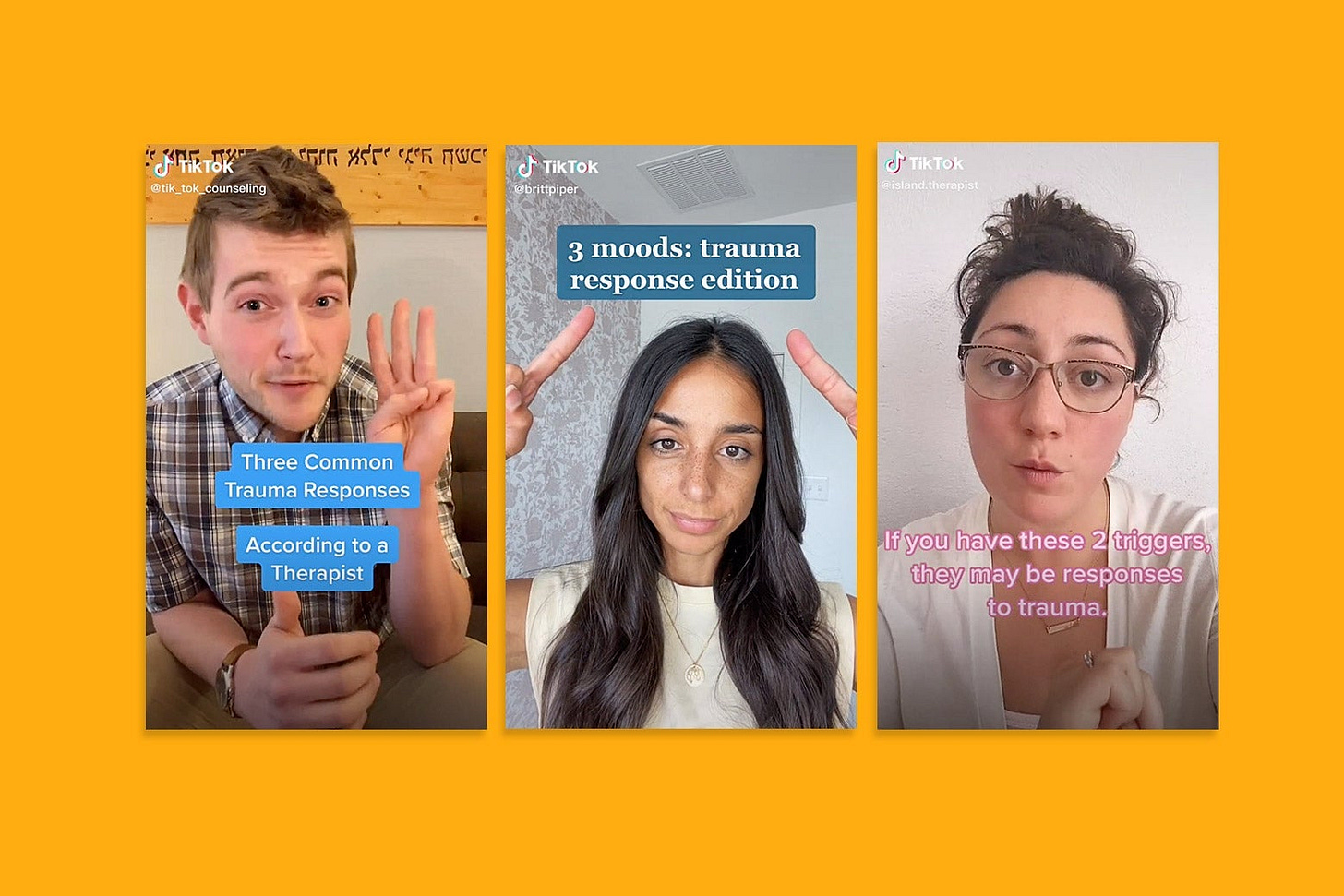The Trivialization of Trauma: When Everything Becomes 'Traumatic'
How pop culture is diluting the term and why this is harmful
That which does not kill me makes me stronger.”
— Friedrich Nietzsche
The term "trauma" has become ubiquitous in our cultural lexicon, applied liberally to describe an ever-widening spectrum of experiences. What was once a clinical term denoting severe psychological injury has morphed into a catch-all phrase for any form of emotional discomfort or life challenge. This semantic inflation not only dilutes the term's meaning but also risks trivializing the profound experiences of those who have endured genuinely traumatic events.
Social media amplifies this problem, fostering echo chambers where trauma is not just acknowledged, but celebrated and used as a catch-all explanation for life's challenges. In these spaces, every personal struggle is reframed through the lens of past hurt, often with sweeping blame assigned to parents or vague "adverse childhood experiences." The pop psychology concept of "attachment styles" is frequently invoked, reducing complex human relationships and behaviors to simplistic categories based on presumed early traumas.
The rise of "trauma content" on TikTok and other social media platforms is shaping a troubling trend among younger generations. Viral videos and posts often oversimplify complex psychological concepts, leading many to self-diagnose trauma or mental health issues based on vague or common experiences. This phenomenon has created a culture where being "traumatized" is almost celebrated, providing a ready-made excuse for any life difficulty.
Young people increasingly attribute struggles in relationships, academics, or careers to presumed past traumas, often without professional diagnosis or context. Ordinary human experiences are being rebranded as symptoms of trauma. Platforms like TikTok and Instagram are rife with content creators and self-proclaimed experts who attribute a wide range of common behaviors and emotions to past traumas.
Perfectionism is no longer seen as a personality trait but as a response to childhood neglect. Social anxiety is routinely linked to bullying or rejection in one's past. Fear of rejection and relationship difficulties are almost universally ascribed to attachment issues stemming from early life experiences.
This oversimplification ignores the complex nature of human psychology and the natural diversity of personality types. By pathologizing these common experiences and labeling them as trauma responses, we risk creating a generation that views itself through a lens of damage and victimhood, potentially undermining personal growth and resilience.
This self-labeling can be profoundly problematic. It risks trivializing genuine trauma, discourages personal responsibility, and may prevent individuals from seeking appropriate help or developing crucial coping skills. Moreover, it can become a self-fulfilling prophecy, where identifying as "traumatized" shapes behavior and perceptions, potentially exacerbating or even creating the very issues one claims to have. This trend not only misrepresents the nature of trauma but also undermines the importance of resilience, growth, and the human capacity to overcome adversity.
This overuse reinforces a "snowflake mentality," where individuals view themselves as uniquely fragile and unable to cope with ordinary stressors. By labeling common life experiences as "traumatic," we risk creating a culture of hypersensitivity where people expect to be shielded from any form of discomfort or adversity.
At its worst, this mindset shifts responsibility away from personal growth and onto external factors, with individuals blaming their environment for their vulnerabilities. This victimhood narrative often leads to unreasonable expectations that others should constantly accommodate and protect them from uncomfortable feelings and insecurities. Such an approach not only stunts personal development but also undermines the resilience necessary to thrive in an inherently challenging world. It's a dangerous trajectory that could result in a society unable to adapt, innovate, or overcome obstacles – essential skills for both individual and collective progress.
The Trauma-Informed Movement
The "trauma-informed" movement, while well-intentioned, has overreached in its attribution of human suffering. By broadening the definition of trauma to encompass nearly all negative experiences, it risks creating a one-size-fits-all explanation for the complex tapestry of human emotional and behavioral issues.
This overgeneralization paradoxically moves us further from effectively identifying and addressing the needs of those genuinely impaired by severe trauma. It blurs the lines between everyday challenges and profound psychological injuries, potentially trivializing the experiences of those most severely affected.
Moreover, this approach often neglects the crucial aspects of recovery and resilience that many trauma survivors exemplify. It creates a culture where victimhood is valorized over resilience, and where the expectation of healing and growth is replaced by a tacit acceptance of permanent damage.
Politicians, activists and influencers leverage trauma narratives for their agendas, promoting a culture of victimhood and blame. These pervasive narratives seep into our collective consciousness, shaping how we view adversity and recovery.
The journey of a true trauma survivor is rarely about seeking accommodations or blaming others, but rather about finding strength they never knew they possessed. These individuals frequently express a desire to move beyond their traumatic experiences, not to use them as a defining characteristic or excuse.
Their stories are often marked by quiet determination, a nuanced understanding of human nature, and a hard-won wisdom that comes from confronting and overcoming profound adversity. This reality stands in sharp contrast to the simplified, often performative victimhood seen in popular media and social platforms, reminding us of the true depth and complexity of trauma recovery.
Given that life inherently involves a series of challenging events, this approach presents significant problems. We now see teenagers and young adults seeking trauma therapy for typical life events such as relationship breakups, friends moving away, parental marital issues, or not achieving certain goals like making a sports team or attending a preferred college. They are seeking out “trauma therapy” and naive and ill-informed therapists are happy to oblige.
I find it challenging to frame these typical life events as traumatic and adhere to this narrative. For instance, equating the emotional consequences of a leg amputation with those of receiving stitches seems misguided. Similarly, a parental divorce, while difficult, is not comparable to witnessing the murder of one's parents. Reasonable individuals can understand that the psychological impact of these events differs significantly.
In clinical practice, I've encountered a concerning trend where clients who don't meet the diagnostic criteria for Post-Traumatic Stress Disorder (PTSD) express frustration or offense when not offered PTSD-specific therapy. These individuals often adamantly defend their self-perception as "traumatized," despite not exhibiting the clinical symptoms required for a PTSD diagnosis. This reaction reveals a troubling disconnect between clinical definitions and popular understanding of trauma. It highlights how the cultural narrative around trauma has shifted, leading some to seek validation through a diagnosis rather than focusing on addressing their actual presenting issues. This situation poses a challenge for mental health professionals, who must balance empathy for a client's distress with the need to provide appropriate, evidence-based treatment for their specific condition.
Severe Trauma vs. Pop Culture's Trauma Narrative
Those who have experienced severe trauma often exhibit a markedly different response compared to the self-labeling trend we see on social media. Survivors of profound traumatic events rarely seek out or embrace trauma-related labels. Instead, they frequently struggle with acknowledging the very experiences that have so deeply affected them.
The memories associated with severe trauma are often so intensely painful and overwhelming that individuals go to great lengths to avoid confronting them. This avoidance is not a choice, but a psychological defense mechanism against reliving the horror and anguish of their experiences.
For these individuals, the consequences of their trauma manifest in severe, often debilitating ways that significantly impact their daily lives. They may struggle with intrusive flashbacks, paralyzing anxiety, or profound depression that interferes with their ability to maintain relationships, hold jobs, or even perform basic self-care.
Many survivors of severe trauma experience a deep sense of shame or guilt, leading them to isolate themselves rather than seek attention or validation for their experiences. Their struggle is often silent and internal, marked by a desperate desire to feel "normal" again rather than to stand out or be identified by their traumatic past.
This stark contrast highlights the profound difference between genuine trauma responses and the trivialization of trauma in popular culture. While social media often portrays trauma as an identity to be claimed or even celebrated, those dealing with the aftermath of severe traumatic experiences usually yearn for healing and a return to a life undefine by their past. Their journey is one of painstaking recovery, not of seeking a label or justification for life's everyday challenges.
Despite the pervasive narrative of widespread trauma and vulnerability, the truth is far more empowering: human resilience is our default state. Research consistently shows that the vast majority of individuals exposed to potentially traumatic events do not develop Post-Traumatic Stress Disorder. This remarkable capacity for resilience is not the exception, but the rule. Our ability to adapt, overcome, and even grow from adversity is a testament to the strength of the human spirit.
Yet, this fundamental truth is being obscured by a tidal wave of social media influencers, pop psychology, and a burgeoning mental health industrial complex. These forces, whether intentionally or not, are undermining our innate resilience by pathologizing normal human experiences and emotions. The mental health field is at risk of being hijacked by those who profit from perpetuating a narrative of widespread trauma and victimhood.
It's time to reclaim mental health from the clutches of this trauma-obsessed culture. We must challenge the industry that has sprung up around labeling and treating an ever-expanding definition of trauma. This is not just about semantics; it's about preserving our collective ability to face life's inevitable challenges with courage and adaptability.
The hard truth is that by constantly seeking to identify and treat "trauma" in every corner of human experience, we may be creating the very problems we claim to solve. We're fostering a generation that views itself as inherently damaged, ill-equipped to handle the normal stresses of life without professional intervention.
It's time for a radical shift. Let's celebrate resilience rather than vulnerability. Let's empower individuals with the knowledge that they are likely to overcome adversity, rather than succumb to it. Let's save the term "trauma" for those who truly need specialized intervention, and in doing so, honor the experiences of severe trauma survivors.
The mental health field stands at a crossroads. Will we continue down the path of ever-expanding diagnoses and treatments, or will we have the courage to refocus on fostering innate human strengths? The choice is ours, and the stakes couldn't be higher. Our psychological well-being – and perhaps the very fabric of our society – hangs in the balance.
RESIST







Thank you for your in depth explanation of real trauma vs. imagined trauma. If seen on a line graph, I predict imagined trauma has increased significantly since the inception of social media.
Thank you so much for this great essay. In the area of Mental Health, it is necessary to go back to the old ways, to clean up the terms and clarify the semiology and semantics that define it. I think that the proliferation of social networks, combined with the proliferation of unqualified professionals, has contributed greatly to this.